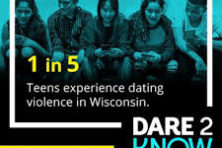Teen Dating Violence Awareness Month
- Share
- Tweet
- Pin
- Share
Teen Dating Violence goes beyond flying fists and date rape. It includes verbal, emotional and social abuse, which is often overlooked by children and many adults. The media portrays confusing messages about what makes a boyfriend a “man” and how a girlfriend should be “sexy” and a “lady.”
In an article by NPR’s Sam Sanders, teens were interviewed at a Chris Brown concert only two years after he violently beat his then girlfriend, the pop star Rihanna. Brown was still in his teens. One 19-year-old that was interviewed stated, “Obviously [Rihanna] played a part in getting beat, or whatever.”
A poll taken by Start Strong, an organization committed to educating teens on healthy relationships, found that close to 50 percent of teens surveyed in a poll believed that Rihanna was to blame for being abused. This is a horrible message for teenagers to reinforce, especially when they are beginning their first relationships and learning how to be respected by their partners. The victim is never to blame in an abusive relationship.
Even more upsetting, after Brown released a YouTube video stating that his actions were 100 percent unacceptable, teenage girls still idolize him. Sanders found a 17-year-old outside of Brown’s concert that stated, “He’s kind of what we would like our boyfriends to model after, in a way” – an example of why 1 in 5 teens experience dating violence (Futures Without Violence).
This unhealthy view of relationships is not the fault of teens everywhere. It is our responsibility as adults to help teach respect and love. There are several resources to remind us the key factors of healthy dating relationships, such as LoveIsNotAbuse.com and LoveIsRespect.org. Below is information gathered from LoveIsRespect.org.
The Key to Healthy Relationships:
• Speak up. In a healthy relationship, if something is bothering you, it’s best to talk about it instead of holding it in.
• Respect your partner. Your partner’s wishes and feelings have value. Let your significant other know you are making an effort to keep their ideas in mind. Mutual respect is essential in maintaining healthy relationships.
• Compromise. Disagreements are a natural part of healthy relationships, but it’s important that you find a way to compromise if you disagree on something. Try to solve conflicts in a fair and rational way.
• Be supportive. Offer reassurance and encouragement to your partner. Also, let your partner know when you need their support. Healthy relationships are about building each other up, not putting each other down.
• Respect each other’s privacy. Just because you’re in a relationship, doesn’t mean you have to share everything and constantly be together. Healthy relationships require space.
Signs of an Abusive Relationship:
• Checking your cell phone or email without permission
• Constantly putting you down
• Extreme jealousy or insecurity
• Explosive temper
• Isolating you from family or friends
• Making false accusations
• Mood swings
• Physically hurting you in any way
• Possessiveness
• Telling you what to do
Fifteen students from Door County will present at the Wisconsin Summit on Teen Dating and Sexual Violence in March. To help them reach their monetary goal for the trip, please visit Econo Foods on February 26 and donate to their cause while they bag groceries.
For support regarding Teen Dating Violence please contact Jess Holland, Youth Advocate at HELP of Door County, Inc. by calling 920.743.8785 or emailing [email protected].
This article is brought to you in part by the Door County Coordinated Community Response (CCR) to Domestic Violence and Sexual Assault Teams and the Door County Elder and Adult-at-Risk Interdisciplinary Team.

